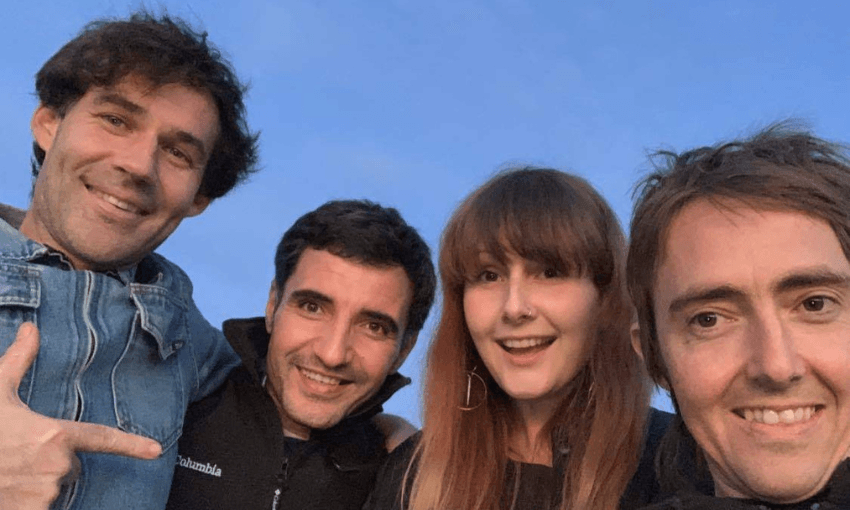Murdoch Stephens introduces us to one of the people whose stories feature in his new book, Visas Now! Aotearoa’s response to global refugee emergencies.
On Thursday my book on Aotearoa’s response to emergency refugee crises was released. I was lucky enough to have the book recount nine community members’ stories of advocacy and escape. In this article I want to share a story of one friend who wasn’t there for the launch because he no longer lives in Aotearoa.
I first met Tariq in 2017 near the tail end of the campaign I started to double New Zealand’s refugee quota. He was visiting Wellington from Canterbury, and considering a permanent move after finishing his PhD in Education. I had been living in a lively house in Roseneath – musician, artist and theatre maker flatmates coming and going – which led to Tariq subletting a room with us for his initial two months in Wellington.
Tariq fit right in. He had lived an incredible life in Afghanistan, committed to the education of girls and young women, and moved through the world with a curiosity that attracted him to our group. For a guy who had been close to death on many occasions, he somehow held on to an open-minded energy as well as his faith. He was always looking for ways to support those who needed help in Afghanistan: such as his social enterprise that imported saffron from Afghanistan and created jobs for women.
Our relationship was neither one way nor charitable. A year later, Tariq came to our group’s rescue. When our lease was ended after more than a decade of rolling over, my flatmates were desperate to find a new home. Tariq was there to point out that the flat above his was becoming available. Our group met the landlord, and with Tariq’s charm and assurances, were signed up with a few weeks to spare. For about a year, our loose group lived in the flat above Tariq, getting to know him, his wife and daughter.
March 2020 rolled around and both Tariq and I found ourselves with nowhere to live. His wife and daughter had been visiting family in Turkey and he had been pushed out of his home so the landlord’s daughter could move in. Covid meant that I gave up my lecturing contract in Beirut a few weeks after I had given up my room in the flat that inspired my novel, Rat King Landlord.
Some of our original group had just moved to Whanganui and had a few spare rooms. This was the third time we had come together. With a fruit-and-veggie-heavy backyard, at the peak of harvest season, the four of us lived well as Covid cases surged, then petered out.
In the background Tariq had been working a range of university and government jobs. At one point I counted the number of people who were dependent on him: 17. Yes, many of these people had some other small incomes, and many were subsisting on the cost of living in Afghanistan not Auckland, but Tariq’s commitment to supporting others must be recognised.
Of course, we all know what happened next: the return of the Taliban across a ramshackle few weeks. I’ll leave it to Tariq to explain what happened, in his own words, from his contribution to Visas Now!
Afghanistan by Dr Tariq Habibyar
It was mid-July 2021 when I learned through social media that the Taliban had surrounded Herat, my birthplace. It was shocking news: with thousands of armed forces defending the city, how could this happen? We later learned that, as with all other parts of Afghanistan, the country was handed over to the Taliban. They didn’t take it by force.
What captured my attention at the time was a famous elderly man from Herat, whose men had previously tortured my family, had taken up arms to fight back against the Taliban. Despite what this man’s men had done to my family, I was filled with admiration for him and I prayed for his victory, from my home in Palmerston North.
Despite the lies told to the people of Afghanistan that the Taliban had changed, many of us knew they had not. Sadly, we were proven right. As an educator and someone who has spent most of my life in the pursuit of learning and teaching, the most grievous act and violation of human rights by the Taliban was the closure of schools and universities for the female members of Afghan society. We knew the Taliban would do exactly that.
By mid-August, city after city and province after province were handed over to the Taliban. Like thousands of families who had worked with the international community inside Afghanistan, my family was forced to flee. Those Afghans who had family members outside Afghanistan were considered lucky because their family members could get them out.
I was desperately trying to help my family. I reached out and sought help from the office of the prime minister to any MP I knew in New Zealand. Almost all of them sent me either a URL or other generic information that was of little or no use during that emergency. Little did I know that the country I am a citizen of, the country I love and take pride in, did not have a policy of “a friend in need is a friend indeed,” at least not towards Afghans or more specifically towards my people.
I soon realised that I should give up on the New Zealand government to help my family. I raised funds through generous Kiwi friends and started talking to my friends around the world who had connections in other countries. Within weeks, we helped my family and several others to escape Afghanistan.
Long story, short: most of these families ended up in North America. As soon as they arrived, they started contributing to the economy and cultural richness of Canada and the USA. A couple of families ended up in Europe.
I am in Canada now and when people ask me where I am from and I say, New Zealand, their response is almost always “wow”.
“Wow” is indeed what New Zealand deserves. It’s one of the most beautiful countries on the planet and it is blessed with indigenous people and many other wonderful people who call this country home. However, as far as immigration policies towards certain nationalities are concerned, it’s not there yet, to say the least.
When all my attempts to save my loved ones and bring them to my home country New Zealand failed, I was deeply disappointed with Immigration New Zealand and the political decision makers. I was deeply disappointed by the policies that made me feel like my loved ones and I didn’t matter. But I believe that Aotearoa has the potential to become an exemplary country not only for its beauty but also for the fair treatment of all, irrespective of their background, race, nationality, and religion.
I caught up with Tariq about two weeks after the last flights had left Kabul airport.
We had a coffee in the sun in Hataitai. I was a little worried about seeing him because I knew he had gone through so much and there is something terrible about being with a friend who feels they have no options left. He was doing better than I had expected, but I also knew that his acceptance was caused by exhaustion not by serenity.
As he writes above, he is no longer in New Zealand: he was able to find the safety for his family across North America that he could not find in Aotearoa. I want to repeat something he wrote, “the policies that made me feel like my loved ones and I didn’t matter.” Tariq is being polite, as he always is. But these are not passing feelings based on bog-standard alienation caused by bureaucracy. These words represent a gut-wrenching realisation of not belonging. As a policy setting it chafes; as something that happens to a close friend it is infuriating.
I wrote Visas Now! to be a resource for communities who are wracked with worry and primed by hope but don’t know where to turn. I’ve been on at least a dozen calls where I let people know what has worked and what hasn’t, the pathways that could be open to them and the people who will decide if they can bring family here.
While New Zealand eventually welcomed around 1,500 non-resident Afghan people, few were the family members of the 6,000-strong Afghan community who were already here.
I know that every crisis situation is going to be different and Cabinet needs flexibility in considering each one. I also know that we’ve only had three intakes of the current eight UN refugee agency emergencies. There has to be some middle ground where those with families in those other five are able to quickly bring their families to safety. I hope this book is the start of the conversation on just how we can do that.
Visas Now! Aotearoa’s response to global refugee emergencies by Murdoch Stephens ($30, Left of the Equator Press) is available to purchase at Unity Books.


